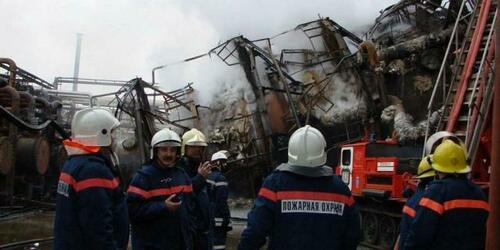
There's been yet another major attack against a Russian oil refinery. In this fresh Saturday incident, a drone launched by Ukraine's SBU security service slammed into Lukoil refinery in Volgograd, which is among the country's largest refineries.
Regional reports say two drones in total hit the primary refining unit, "without which the plant will lose a significant part of its production capacity."

Ukrainian sources declared that the "The SBU continues to systematically destroy the infrastructure used by Russia to wage war in Ukraine." A large fire at the plant resulted. "By attacking oil refineries that support Russia's military-industrial complex, we not only disrupt fuel logistics for enemy vehicles but also reduce funds flowing into the Russian budget," the SBU said.
The extensive fire has since been extinguished, but not before doing significant damage, apparently:
The fire has already been extinguished, but at its peak, it spread over 300 square meters. Despite this, the governor of Volgograd Oblast, Andrey Bocharov, claimed that the drone attack was repelled.
The Security Service of Ukraine has lately claimed responsibility for a string of drone attacks on Russian refineries over the past several weeks.
The range of Ukraine's drone and missile arsenal appears to have significantly increased of late, leading the Kremlin to suspect these are Western-supplied weapons being used on Russian territory. It's also likely that Kiev could have targeting help from the US, UK, or France. Moscow has also of late complained especially that French mercenaries are on the ground in northern Ukraine.
This new drone attack is believed to have been launched from Kharkiv, like other recent attacks. The distance from Kharkiv to the southern city of Volgograd is over 600km, which is a significant flight time for the suicide drone. Russian oil exports have remained strong throughout nearly two years of war, despite US-led sanctions, in large part due to countries like China and India.
The Ukrainian Army launched suicide drones at Volgograd (formerly known as Stalingrad) last night.
— Visegrád 24 (@visegrad24) February 3, 2024
A massive fire started in one of the largest oil refineries in the country.
It was the first time Ukraine struck Volgograd this war. pic.twitter.com/TlTaibhI2W
These stepped up efforts by Kiev to target Russian energy is dangerous trend which looks to only continue, but which will invite greater Russian retaliation on Ukrainian cities, given also that Ukraine is receiving longer range missiles which were pledged last year:
Washington plans to ship its first batch of ground-launched long-range bombs to Kiev this week. The arms were designed for the Ukrainian military and will give Kiev another option for deep strikes.
The new weapon was developed by Boeing and Saab. It combines a 250-pound guided bomb intended to be launched by an aircraft and straps it to a rocket motor. Washington believes it has a range of 90 miles.
Boeing and Saab pitched combining the GBU-39 Small Diameter Bomb (SDB) with the M26 rocket motor in November 2022. President Joe Biden approved the transfer of the long-range bomb to Ukraine in February 2023. However, the delivery of the munitions was delayed because it needed to be developed and tested.
Politico spoke with four officials who confirmed the first batch would arrive in Ukraine this week. The officials touted the weapons as giving Ukraine “a significant capability.” “It gives them a deeper strike capability they haven’t had, it complements their long-range fire arsenal,” the US official said. “It’s just an extra arrow in the quiver that’s gonna allow them to do more.”
This spate of attacks has also raise questions about the quality of Russian air defense systems around key infrastructure facilities, or if they are present at all for that matter.
Russian oil exports made up about 30% of the country's budget revenues. As of 2023, Russia became China's number one oil supplier, taking the top spot long held by Saudi Arabia.
There’s been yet another major attack against a Russian oil refinery. In this fresh Saturday incident, a drone launched by Ukraine’s SBU security service slammed into Lukoil refinery in Volgograd, which is among the country’s largest refineries.
Regional reports say two drones in total hit the primary refining unit, “without which the plant will lose a significant part of its production capacity.”

Ukrainian sources declared that the “The SBU continues to systematically destroy the infrastructure used by Russia to wage war in Ukraine.” A large fire at the plant resulted. “By attacking oil refineries that support Russia’s military-industrial complex, we not only disrupt fuel logistics for enemy vehicles but also reduce funds flowing into the Russian budget,” the SBU said.
The extensive fire has since been extinguished, but not before doing significant damage, apparently:
The fire has already been extinguished, but at its peak, it spread over 300 square meters. Despite this, the governor of Volgograd Oblast, Andrey Bocharov, claimed that the drone attack was repelled.
The Security Service of Ukraine has lately claimed responsibility for a string of drone attacks on Russian refineries over the past several weeks.
The range of Ukraine’s drone and missile arsenal appears to have significantly increased of late, leading the Kremlin to suspect these are Western-supplied weapons being used on Russian territory. It’s also likely that Kiev could have targeting help from the US, UK, or France. Moscow has also of late complained especially that French mercenaries are on the ground in northern Ukraine.
This new drone attack is believed to have been launched from Kharkiv, like other recent attacks. The distance from Kharkiv to the southern city of Volgograd is over 600km, which is a significant flight time for the suicide drone. Russian oil exports have remained strong throughout nearly two years of war, despite US-led sanctions, in large part due to countries like China and India.
The Ukrainian Army launched suicide drones at Volgograd (formerly known as Stalingrad) last night.
A massive fire started in one of the largest oil refineries in the country.
It was the first time Ukraine struck Volgograd this war. pic.twitter.com/TlTaibhI2W
— Visegrád 24 (@visegrad24) February 3, 2024
These stepped up efforts by Kiev to target Russian energy is dangerous trend which looks to only continue, but which will invite greater Russian retaliation on Ukrainian cities, given also that Ukraine is receiving longer range missiles which were pledged last year:
Washington plans to ship its first batch of ground-launched long-range bombs to Kiev this week. The arms were designed for the Ukrainian military and will give Kiev another option for deep strikes.
The new weapon was developed by Boeing and Saab. It combines a 250-pound guided bomb intended to be launched by an aircraft and straps it to a rocket motor. Washington believes it has a range of 90 miles.
Boeing and Saab pitched combining the GBU-39 Small Diameter Bomb (SDB) with the M26 rocket motor in November 2022. President Joe Biden approved the transfer of the long-range bomb to Ukraine in February 2023. However, the delivery of the munitions was delayed because it needed to be developed and tested.
Politico spoke with four officials who confirmed the first batch would arrive in Ukraine this week. The officials touted the weapons as giving Ukraine “a significant capability.” “It gives them a deeper strike capability they haven’t had, it complements their long-range fire arsenal,” the US official said. “It’s just an extra arrow in the quiver that’s gonna allow them to do more.”
This spate of attacks has also raise questions about the quality of Russian air defense systems around key infrastructure facilities, or if they are present at all for that matter.
Russian oil exports made up about 30% of the country’s budget revenues. As of 2023, Russia became China’s number one oil supplier, taking the top spot long held by Saudi Arabia.
Loading…




